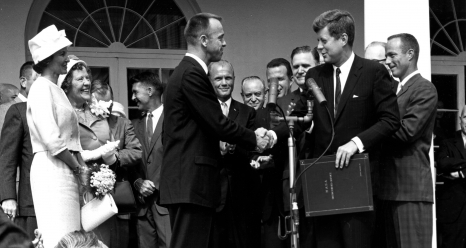“…this city of Houston, this State of Texas, this country of the United States was not built by those who waited and rested and wished to look behind them. This country was conquered by those who moved forward–and so will space”, said President John Kennedy at Rice University (09/12/1962), in what has come to be known as his “Moon Speech.”
When Kennedy spoke of “this country,” he painted with a very broad brush. The South is a part of “this country.” It is also where NASA set up shop, and Kennedy went to sell the space program. And in the case of this particular region, the exact inverse of Kennedy’s words might be closer to the truth. The agrarian John Crowe Ransom, of I’ll take My Stand fame, argued that the South was “built by those who waited and rested and wished to look behind them.”
Ransom and the “fugitive agrarians” claimed that the South was unique on this continent for having established a society modeled on traditional European culture which favored establishment, rootedness, agrarianism, provincialism, piety, and was skeptical of industrialism, centralization of power, and progress.
Both Ransom and Kennedy fail to acknowledge that much of the South (nay, much of America) was built on the backs of slave labor. The slaves do not fit neatly into Kennedy’s progressive, Whig theory of history or John Crowe Ransom’s Southern tradition (Southern ideal, really). Slavery shouldn’t be brushed under the rug, and I don’t intend to do so. I only wish to point out that Kennedy’s vision was not a Southern vision. One can clearly see this by juxtaposing the words of JFK and JCR.
Kennedy is right to say “this country was conquered…” but in the South, argues Ransom, the conquering was a temporary phase.
The pioneers explored the soil, determined what concessions it might reasonably be expected to make them, housed themselves, developed all their necessary trades, and arrived by painful experiment at a thousand satisfactory recipes by which they might secure their material necessities. Their descendants had the good sense to consider that this establishment was good enough for them.
In Ransom’s idealized view, once they had achieved a stable, heritable, agrarian society, they stopped pioneering. They had achieved their goal. Such a society did not keep men toiling at the factory, running around the big city, or venturing to new lands. It allowed for, as Ransom wrote, “a leisure, a security, and an intellectual freedom that were never the portion of pioneers.” (Of course, it was not was not so leisurely for slaves.)
Ransom wrote, “The pioneer life is not the normal life, whatever some Americans may suppose.” He pointed to European cultures. Their goal was not efficiency, GDP growth, or the invention of new gadgets. They did all they could to foster a “reflective and aesthetic life.” They were backward looking and intensely provincial. Such was life in the American South, according to Ransom. He notes that “taking it easy” was a Southern tradition (albeit, not one in which many slaves could partake). Compare that to Kennedy’s words regarding “outer space”:
Its hazards are hostile to us all. Its conquest deserves the best of all mankind, and this opportunity for peaceful cooperation may never come again. But why, some say, the moon? Why choose this as our goal? And they may well ask why climb the highest mountain? Why, 35 years ago, fly the Atlantic? Why does Rice play Texas?
We choose to go to the moon. We choose to go to the moon in this decade and do the other things, not because they are easy, but because they are hard, because that goal will serve to organize and measure the best of our energies and skills, because that challenge is one that we are willing to accept, one we are unwilling to postpone, and one which we intend to win, and the others, too. …
Kennedy used the “man versus nature” theme repeatedly. He suggested that the very existence of a natural obstacle demanded that men strive to overcome it:
Many years ago the great British explorer George Mallory, who was to die on Mount Everest, was asked why did he want to climb it. He said, “Because it is there.” Well, space is there, and we’re going to climb it, and the moon and the planets are there, and new hopes for knowledge and peace are there. And, therefore, as we set sail we ask God’s blessing on the most hazardous and dangerous and greatest adventure on which man has ever embarked.
According to Ransom, Southerners did not seek to overcome nature. They would make a truce with nature and accept the limits nature placed upon them. By contrast, Kennedy sought to overcome those limits and dominate nature in a Baconian fashion. The contrast between the Ransom’s vision of the South and Kennedy’s vision of America is the contrast between traditional and modern society:
In most societies, man has adapted himself to environment with plenty of intelligence to secure easily his material necessities from the graceful bounty of nature. And then, ordinarily, he concludes a truce with nature, and he and nature seem to live on terms of mutual respect and amity, and his loving arts, religions, and philosophies come spontaneously into being: these are the blessings of peace. But, the later day societies have been seized – none quite so violently as our American one – with the strange idea that the human destiny is not to secure an honorable peace with nature, but to wage an unrelenting war on nature.
By the term “American” Ransom meant the North. And so, he distinguished between the “American” and “Southern” traditions. He characterized the “American” (or Northern) mentality as ambitious and claimed it was motivated by two ideals: progress and service. Kennedy appealed to both types in his speech: “We set sail on this new sea because there is new knowledge to be gained and new rights to be won, and they must be won for the progress and use of all mankind.” There is a two-part message here: 1) innovation and pioneering will improve humanity; and, 2) we owe it to all of humanity to innovate and pioneer. The former part is what Ransom would have called “progress”; the latter is what he would have called “service.” “Along with the gospel of Progress goes the gospel of Service,” wrote Ransom. “They work beautifully as a team.”
Ransom believed that progress was a primary, masculine ambition to inflict one’s will upon nature. Service was a secondary, feminine ambition to concern oneself with the thoughts, feelings, and activities of one’s neighbors. “If it is Adam’s curse to will perpetually to work his mastery upon nature,” wrote Ransom, “It is Eve’s curse to prompt Adam every morning to keep up with the best people in the neighborhood in taking the measure of his success.”
Kennedy talked about pioneering and conquest which are progressive, while insisting the U.S. charge ahead of all other nations and do so “for the service of all mankind.” Throughout history, when a politician or social critic embraces progress, they almost always embrace service as well. New technology has always convinced ambitious men that traditional barriers (distance, gravity, cultural differences, human nature, etc.) were things of the past. Take, for example, Stephen Douglas of Illinois who defended western pioneering (manifest destiny) by citing the steam engine’s ability to bring men closer together, thereby enabling America to stretch her borders without endangering her traditions and institutions. Or H.G. Wells, who believed that air travel would make men more peaceful and enable the nations of the world to establish a global governing body, a “new world order.” Ambitious men have always tended toward progress and service. The North has historically been ambitious, few will deny.
Ransom proudly insisted that the South was not ambitious. In his reflection, the Southerner, upon making his peace with nature, tilled his own field and swept around his own backdoor (unless, of course, he had slaves to do this for him). He did not bother “keeping up with the Jones’s.” He did not strive to put nature under his heel or tell his neighbors how to live. He did not strive to be a superman, or a missionary. He loved his land, simply because it was his. And as long as he had his land, he felt no reason to pioneer or explore. Evidently, President Kennedy was unaware of this part of the Southern tradition:
Those who came before us made certain that this country rode the first waves of the industrial revolution, the first waves of modern invention, and the first wave of nuclear power, and this generation does not intend to flounder in the backwash of the coming age of space.
President Kennedy believed the industrial revolution was a necessary part of American history. Ransom agreed that America had industrialized, but he saw that as a negative development:
Industrialism is a program under which men, using the latest scientific paraphernalia, sacrifice comfort, leisure, and the enjoyment of life to win Pyrrhic victories from nature at points of no strategic importance.
Ransom gave that definition in 1930. He was thinking of automobiles and airplanes. I can only imagine the animosity he must have had for the Apollo missions, which he lived to see but wrote nothing about (as far as I know).
“Industrialism is an insidious spirit, full of false promises and generally fatal to establishments since, when it once gets into them for a little renovation, it proposes never again to leave them in peace,” wrote Ransom. And so he called on Southerners to resist the “foreign invasion of Southern soil” that was industrialism. He claimed that it was “capable of doing more devastation than was wrought when Sherman marched to the sea.” He cautioned that industrialism “needs to be strongly governed or it will destroy the economy of the household.” And “only a community of tough conservative habit can master it.”
When Ransom warned of “industrialism,” he did not strictly mean factories or mass-production. More specifically, he condemned industrialism’s “insidious spirit, full of false promises and generally fatal to establishments.” If he were alive, I am sure he would argue that the “insidious spirit” has indeed wrought damage to the traditional establishment of the South, as well as the rest of the country.
Kennedy’s moon speech embodied the insidious spirit. He claimed that man must overcome the limitations that nature places upon him because “they are there.” If overcoming these limitations proves extremely difficult, life threatening, and costly… all the more reason to press forward. After all, we choose to do these things “not because they are easy, but because they are hard.”
Why can’t men live together in a global system as equals, as H.G. Wells said we could? Why can’t man walk on the moon? “Why can’t a woman be more like a man?” asked Prof. Henry Higgins in My Fair Lady. The insidious spirit considers all distinctions in nature to be walls that must come down in the name of progress and service. “The United States was not built by those who waited and rested and wished to look behind them. This country was conquered by those who moved forward, and so will space. . . . We set sail on this new sea because there is new knowledge to be gained and new rights to be won, and they must be won for the progress and use of all mankind.” The insidious spirit of industrialism yields to no limits, and these violations bring inevitable consequences.
Long before the modern trappings of industrialism, ambitious men have sought to overcome natural barriers. See Genesis 11 for an early example:
They said to each other, “Come, let’s make bricks and bake them thoroughly.” They used brick instead of stone, and tar for mortar. Then they said, “Come, let us build ourselves a city, with a tower that reaches to the heavens, so that we may make a name for ourselves; otherwise we will be scattered over the face of the whole earth.”
But the Lord came down to see the city and the tower the people were building. The Lord said, “If as one people speaking the same language they have begun to do this, then nothing they plan to do will be impossible for them. Come, let us go down and confuse their language so they will not understand each other.”
So the Lord scattered them from there over all the earth, and they stopped building the city. That is why it was called Babel —because there the Lord confused the language of the whole world. From there the Lord scattered them over the face of the whole earth. (Genesis 11:3-9)
The men who built the Tower of Babel learned what Ransom meant when he wrote “Nature wears out man before man can wear out nature.”
I do not entirely agree with the Southern tradition. We can all agree, for instance, that slavery was evil. But I believe there is value in Ransom’s articulation of the Southern tradition. And I wish that as we celebrate the 50th anniversary of the Apollo 11 moon mission, we would look to the Southerner who does not, like The Man of LaMancha, “reach for the unreachable star.” And that we would look to the Southerner who loves his land simply because it is his. You have to love a thing before it becomes lovely. As Chesterton wrote, “Men did not love Rome because she was great. Rome was great because men had loved her.” Perhaps, contra Kennedy, “those who rest and look behind them” make the best builders.













An interesting set of reflections here, John. Still–no mention in the whole piece of the Tennessee Valley Authority? Obviously with the 50th anniversary of the moon landing tomorrow you have an obvious hook to hang your comparison upon, but still, between Ransom’s comments in 1930, and Kennedy’s speech in 1962, there is the small fact that massive numbers of Southern voters happily, and apparently quite gratefully, welcomed the “insidious spirit” of industrialism, if it meant being able to “overcome nature” in the form of electrification and air conditioning. That takes nothing away from your argument on the level of ideals, of course, but it seems to me an asterisk worth inserting.
My goodness! This is one of the best essays ever published on FPR.
@Russel Of course Ransom was articulating an ideal, not describing a reality. At times when a way of life is under threat you need to articulate its principles if you are to have any hope of defending it. As we know, it failed, but we still need Ransom and his sharp articulation of what I’ll call the contented life.
“Why does Rice play Texas?”
That line always cracks me up. Maybe you have to have lived in Texas…
I’d argue that building a self-sufficient, self-sustaining family is just about the most ambitious thing possible. Certainly far more than the alternative…
Appreciate your article and so I wrote some brief thoughts down.
https://theohub.micro.blog/2019/07/19/moon-or-land.html
Since discovering FPR some months ago, I’ve endeavored to read every piece published by the magazine and am consistently rewarded with thoughtful pieces like this. My senior seminar in college many years ago was over the Southern agrarians and I remember reading ‘I’ll Take My Stand.’ It seemed and sounded so strange to my mind then, to read something that lauded (convincingly) Southern culture. I wrote my senior paper on the death of the Southern gentleman and promptly moved on after graduating, only to return to the subject matter of the course these many years later – a husband, a father, a long-distance commuter to a big city – and find that the appeals to my young, 20-something mind of wanderlust and mobility were “childish things,” to quote the Apostle Paul. Rather, the tiresomeness of the constant press upward and forward is contra the human spirit, and to settle and find a place and to love it well is good for the soul – that was wasted on me back then, even though I found it remarkable. I’m glad to encounter its wisdom here again – both at FPR and in this wonderful essay.
Comments are closed.